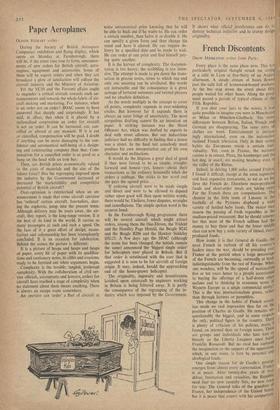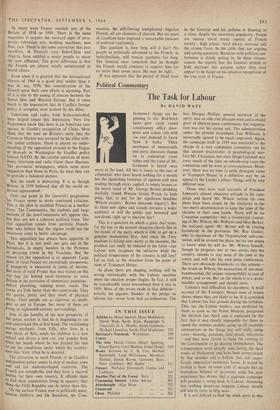French Discontents
DREW MIDDLETON writes from Paris: Every place is the same place now. This no particularly original thought struck me sittin at a cafe in Lyon at five-thirty of an August afternoon. A steady stream of buses flowed past the cafe full of homeward-bound workers.
At the bus stop down the street about fifty people waited for other buses. Along the pave-, ment passed a parade of typical citizens of tliff Fifth Republic. If you shut your ears to the voices, it was quite possible to imagine you were in Manchester or Milan or Mtinchen-Gladbach. The outer differences between Briton; Italian, French and German are disappearing. The same sorts of clothes are worn. Entertainment is increas- ingly international, even on the nationalist- inclined French television. Only in their eating habits do Europeans retain a certain indi- viduality. Yet, even in France, the national cuisine is in retreat. Pizza, the hamburger and the hot dog, le snack, are making headway even in the valley of the RhOne.
Indeed, in driving 1,800 miles around France, I found it difficult, except at the most expensh and least expensive restaurants, to eat as we be- lieve the French do. Elsewhere mass-produced foods and short-order meals are taking over. For the French there are compensations. The chemist in the little town of Limoux in the foothills of the Pyrenees displayed a wide variety of bottled baby foods. The visitor maY mourn the passing of fresh vegetables in the medium-priced restaurant. But he should remeht- ber that most of the French seldom had the money to buy these and that the lower middle class can now buy a wide variety of tinned, mass- produced foods. How ironic it is that General de Gaulle, the most French in outlook of all his country's leaders since the war, should be presiding over France at the period when a large percentage of the French are becoming, outwardly at least, indistinguishable from the rest of Europe. What, one wonders, will be the appeal of nationalism five or ten years hence to a people accustomed to buying the offerings of a half-dozen Mlle,'" nations and to thinking in economic terms 0„1 Western Europe as a single commercial entitYf This is the way internationalism grows, rather than through lectures or pamphlets. This change in the habits of French socia has made no real impression thus far on the position of Charles de Gaulle. He remains WI questionably the biggest, and in some respects the only, political figure in the country. There, is plenty of criticism of his policies, more, / found, on internal than on foreign issues. The are groups and individuals who hate him al fiercely as the Liberty Leaguers once hate”; Franklin Roosevelt. But no rival has capture the imagination or the support of the opposition, which, in any event, is torn by personal and ideological feuds. One simple reason for de Gaulle's prestige emerges from almost every conversation. France is at peace. After twenty-five years of war' defeat, frustration and casualties, the Republic need fear no new casualty lists, no new taxes.. for war. The general talks of the grandeur et France, her independence of the United State, but it is peace that counts with his compatriots, In many ways France reminds ane of the Britain of 1958 or 1959. There is the same eagerness to acquire the outward signs of pros- perity—television sets, washing machines, new flats, cars. There is the same conviction that past sacrifices, in France's case Indo-China and Algeria, have entitled a weary people to enjoy the new affluence. The great difference is that the French are almost totally uninterested in
World affairs. , Even when it is granted that the international climate of 1964 is a good deal milder than it Was in, say, 1959, this concentration of the French upon their own affairs is alarming. Part of it is due to the easing of tension between the Soviet bloc and Western Europe. But it owes much to the impression that de Gaulle's foreign policy is accepted, even praised by his allies.
Television and radio, both State-controlled, have helped create this impression. Very few Frenchmen know that there is an American case against de Gaulle's recognition of China. Most think that his veto on Britain's entry into the Commori Market was accepted by his allies with- out undue criticism. There is almost no under- standing of the opposition aroused in the Hague or Brussels or Washington by Gaullist policy toward NATO. By the careful selection of news items, television and radio foster these illusions.
The provincial newspapers, which seem more outspoken than those in Paris, do what they can to provide a balanced picture.
But the result is depressing. It is as though Britons in 1939 believed that all the world en- dorsed appeasement.
Only one point in the General's programme for France seems to invite continued criticism.
This is the plan to establish France as a nuclear force. The Communists, the students and large sections of the non-Communist left oppose this, but they are not a cohesive political force. The real opposition comes from patriotic French- men who believe that the r6gime could use the enormous sums to better advantage.
This opposition has always been apparent in Paris. But it is not until one gets out in the boondocks, in empty hamlets in the Pyrenees or decaying towns in the Vaucluse, that the reason for.the opposition is so apparent. Large Parts of rural France are exceedingly prosperous, if prosperity is measured in terms of income. nut most of rural France that was visited on this trip lags far behind rural Germany or rural Britain in the provision of elementary amenities: indoor plumbing, running water, roads. The towns are little better than the countryside. They are quaint, pretty and they smell of physical decay. Their people are as vigorous, as intelli- gent as any in Europe, but many of them are living in eighteenth-century surroundings.
One of ;the benefits of the new prosperity of the urban worker is that he is beginning to see
and understand this at first hand.-The vacationing garage mechanic from Lille, who lives in a new block of flats, sends his children to a new school and drives a new car, can wander back from the beach where he has pitched his tent to see the conditions under which his country- men live. Very often he is shocked.
The attraction to most French of de Gaulle's independent policy seems to stop at nuclear arms and aid for underdeveloped countries. The I'ench are xenophobic and they have a visceral feeling for their own country. It offends them
to find their compatriots living in squalor; they think the Fifth Republic can do better than this. On the surface France now is politically quiet. Gaston Defferre. and his Socialists, the Corn-
munists, the still-fuming transplanted Algerian French, all are elements of discord. But six years of Gaullism have imposed a remarkable measure of political conformity.
The question is, how long will it last? No people as politically advanced as the French, as individualistic, will remain apathetic for long. The General once remarked that he thought the French would continue to support him for no more than seven years. He may be right.
It was apparent that the period of blind trust in the General and his policies is drawing to a close, despite his enormous popularity. People are uneasy about many aspects of French society:. high prices, rural decay, overseas aid, the atomic force. In the cafés they are arguing and asking questions. Boredom with political con- formism is slowly setting in. In these circum- stances the reports that the General intends to hold elections this autumn rather than next appear to be based on his intuitive recognition of the true state of France.







































 Previous page
Previous page